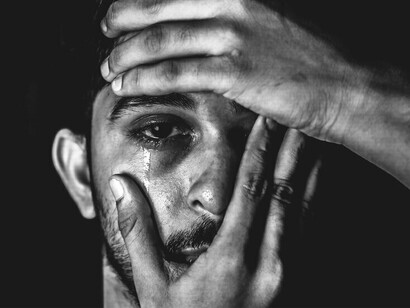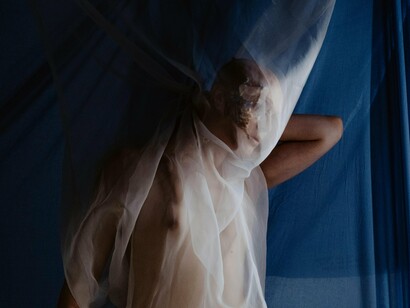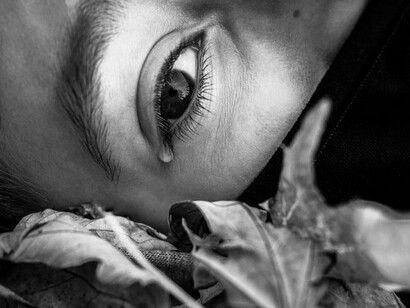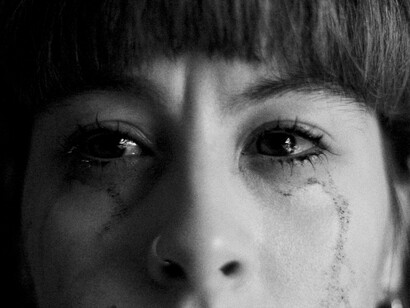All the details wounded my eyelashes before they reached my heart. I never asked to be in this situation, nor did I ask for these details to explode within me after her death. Whenever drowsiness overcame me in those first days after her departure, every second that passed remained alive within my cells. Everything—the oral tubes I held, the nasal tubes, her hands—was etched in memory during moments when hope was slipping away, uncertain whether she was still alive or had lost consciousness from fever, or when breathing felt harder than escaping a glass bottle into the sky.
She was often unresponsive for long periods, but whenever I heard my name screamed, I knew I had to be there immediately. I would drop whatever was in my hands and come to ask about the oxygen in her blood, the exact time the crisis began, and what had happened in full detail. In those moments of unresponsiveness, my hands would embrace hers and squeeze firmly—this was our way of communicating. I often woke to the sound of her voice, calling for help as she had before.
Exactly one year before the day she passed, I tried to travel somewhere I hadn’t been in years. I attempted to awaken what remained of me—the free fragments of my heart that loved to travel—but that night a loud inner feeling made me hesitate repeatedly, and I could not sleep. I felt that something terrible was going to happen. I thought maybe I would die, maybe I would be caught in an accident, or maybe other unknown things. The feeling screamed inside me. I called my mother and told her I could not sleep and felt something dreadful was on the way, though I did not know what it was.
The reality was beyond the simplicity of life or death—it was clearer and more painful than my mind could comprehend, but my soul screamed loudly enough to teach me. One morning I left along a dry road in summer; the wind began to lighten and the sky cleared. I arrived at the city and went with my uncle’s family to a seaside place. The evening passed quietly. I drank my
coffee slowly, questioning with every sip what had happened.
At dawn the following day, my feeling vanished from my soul and materialized before me. That morning, I woke, prepared for my morning coffee and other tasks, and was told that she had found peace. I usually do not pay attention to morning chatter, especially when my body is free of caffeine, so I nodded in agreement. Then I felt the world stop and life extinguish in a way that shocked my heart and redefined the meaning of words, exploding my face in silent shock.
“What did you say? Peace? How? Yes, I agree, visitors are not allowed...” Peace meant she had died. I wept in someone’s arms; my soul awakened and then fell asleep again through my tears. When the crying stopped, I told myself I had not said goodbye. No, I had said farewell.
It was strange that she was the last person I said goodbye to before I travelled, and I was told that perhaps this was the last moment I would have with her after the struggle with illness. Even after two years, I still say, "If only I had seen her in a white shroud, her features relaxed after all she endured, after the many tubes inserted in her mouth for cleansing."
I saw her under the nurse’s supervision several times, and sometimes everything felt like an obligation to be fulfilled. I felt I was in a state where my mind and heart merged; I understood how to organize visitors’ access and developed a profound awareness of one lying sick between life and death. No major medical solution was available, only small treatments clung to with hope.
I was the youngest person; the others, due to their age or illness, could not offer any medical assistance. For a time, I felt I was writing everything under control, yet all situations revolved around her being suspended between life and death. She hated doctors who mourned around her.
My room was fully equipped medically for her. Every crisis meant her breathing was interrupted. During the COVID era, few medical staff were willing to examine her, and emergency rooms were reluctant to see her case. Thus, I witnessed the pain of life and death here and there—the pleading for release from pain and all the aftermath from its peaks and falls and its impact on elderly people.
Every moment I thought she had died, she had not; it was another pulmonary crisis or food slipping into her lungs, suddenly preventing her from breathing.
When I saw a coach speak on trauma in my personal life, I felt I had been struck by post-traumatic stress. My brain cells began to awaken at midnight, replaying the details of the IV drips and the tracheal suctioning while I tried to insert the tube and her eyes staring helplessly at me.
She possessed rare intelligence. I never believed even once that she suffered from Alzheimer’s, although I would play with her like a child, and she enjoyed my teasing. Her fascination with colours changed her facial expressions. She would always appear in my dreams, embracing me deeply while I wept bitterly. I saw her in the image of a woman in her forties, although I never saw her that young while awake.
My dreams never ceased, visions unbroken. At the beginning of her departure, the same dream was repeated: a deep embrace, as deep as a well. I would awaken with tears in my eyes and scratches on my soul from the pain of that dream.
Over time, distance from what passes—whether painful or dreamlike—resides within us as a strange security and comfort. From the perspective of pain, after two years or more, we understand more, forget a little, but never truly forget.
As I have always said and will continue to say: there has been no one like her, and there never will be.















